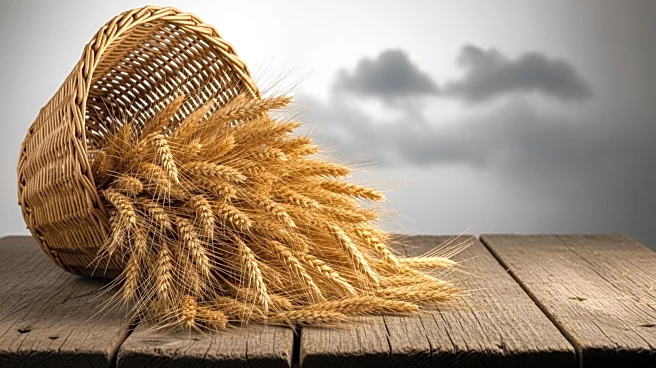What's Happening?
South Africa's grain sector has reported a record harvest of over 23 million tonnes, marking a 30% increase from the previous year. This achievement was celebrated at a gala event in Boksburg, where Hansie Viljoen was named Grain SA and Syngenta's Grain Producer
of the Year. John Steenhuisen, Minister of Agriculture, highlighted the strategic importance of agriculture to South Africa's economy and pledged government support to maintain competitiveness and reduce bureaucratic hurdles. Despite the record harvest, the sector faces economic challenges due to lower output prices and rising input costs, which are squeezing profit margins for farmers.
Why It's Important?
The record grain harvest is crucial for South Africa's food security and positions the country as a significant regional supplier. It contributes to stabilizing the trade balance and creating jobs. However, the economic pressures of lower commodity prices and higher production costs threaten the financial viability of farmers. The government's commitment to supporting the sector through improved logistics, regulatory efficiency, and international market access is vital for sustaining growth and competitiveness. The situation underscores the need for strategic interventions to balance consumer benefits from lower food prices with the economic sustainability of producers.
What's Next?
The South African government plans to enhance support for the grain sector by facilitating access to new breeding technologies and fostering innovation through partnerships like those between the Agricultural Research Council and Syngenta. Efforts to improve logistics and open new international markets are ongoing, aligning with the Agriculture and Agro Processing Master Plan. These initiatives aim to mitigate the economic challenges faced by farmers and ensure the sector's long-term growth and competitiveness.
Beyond the Headlines
The grain sector's success and challenges reflect broader economic dynamics, including the impact of global commodity markets and domestic policy environments. The government's role in reducing red tape and fostering innovation is critical in adapting to these dynamics. The situation also highlights the delicate balance between consumer interests and producer sustainability, a common theme in agricultural economies worldwide.















